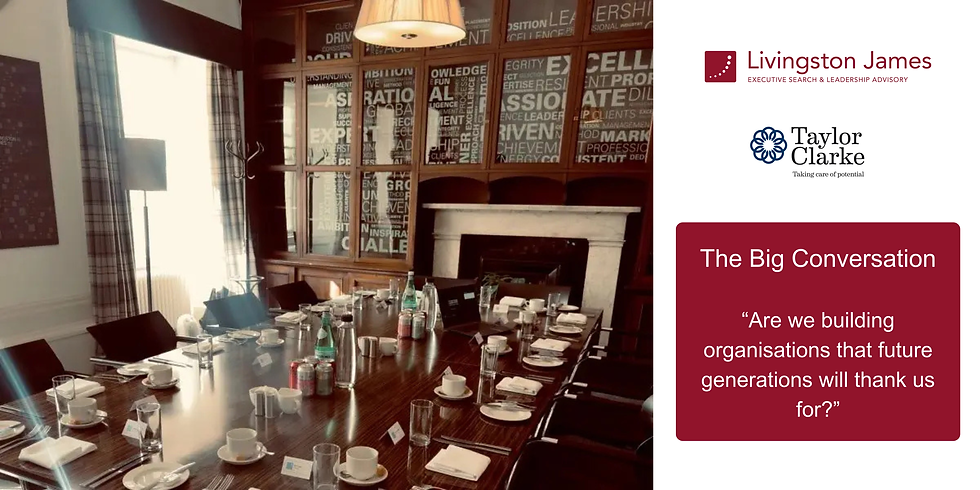Why Emotional Intelligence Is the Cornerstone of Executive Coaching
- Taylor Clarke

- Oct 28, 2025
- 3 min read
Leadership has never been just about making decisions and, here at Taylor Clarke, listening to the challenges our clients tell us about we know that it’s no longer enough to rely on past experience, technical knowledge or expertise. Today’s leaders need to enable their people to find innovative approaches, and quickly, to keep up with the demands of fast-paced ever-evolving business, technological, societal and global pressures. Life today requires leadership that inspires teams, fosters trust and enables fresh thinking and independent problem solving, looking for solutions to the challenge of ‘do more with less’ all the while driving sustainable growth.
Against this backdrop it’s not hard to see why executive coaching has emerged as a powerful catalyst for personal and professional transformation, with development of emotional intelligence (EI) as the engine for much of this success.
So what Is Emotional Intelligence?
Emotional intelligence, refers to the ability to recognize, understand, manage, and influence emotions—both your own and those of others. The best known author on this topic, Daniel Goleman, named five key components:
Self-awareness
Self-regulation
Motivation
Empathy
Social skills
These traits form the foundation of emotionally intelligent leadership, which executive coaching seeks to cultivate. Let’s explore how.
1. Self-Awareness fuels personal and professional growth - coaching begins with introspection. Leaders learn to identify their own emotional triggers, biases, and habitual responses so that they can in turn make more conscious choices rather than reactive decisions.
2. Empathy builds stronger relationships - Leaders coached to develop their EI can access greater empathy in themselves, allowing them to better understand team dynamics and individual needs, thereby fostering psychological safety, loyalty, and collaboration.
3. Self-Regulation enhances executive presence - emotional control is key to maintaining composure under pressure; executive coaches help leaders develop techniques to manage stress, conflict, and uncertainty with grace.
4. Motivation drives purposeful action - building greater EI helps leaders connect with their intrinsic motivations and align them with their purpose at work; executive coaching channels this energy into focused, values-driven leadership.
5. Social Skills strengthen influence - people commonly bring interpersonal challenges to executive coaching. Coaches help refine messaging, model active listening, and offer different techniques for exploring tricky situations, resolving interpersonal conflict and freeing up ‘stuck’ thinking, for example. Leaders become more persuasive, empathetic, and effective in engaging stakeholders. Executive coaches provide a valuable ‘mirror’ function, reflecting back emotional patterns and blind spots, as well as supporting leaders to move toward more emotionally intelligent behaviours and decisions.
We know this to be true because we see it in the leaders who train with us to obtain the ILM Level 7 qualification in Executive Coaching which we have been offering for over 12 years. The spin offs from this programme go far beyond the acquisition of new ‘coaching’ skills and knowledge. Participants tell us how their ability to reflect on their professional practice and the development of their own emotional intelligence has transformed their workplace relationships and interactions.
Just as transformation through coaching is gradual and deeply personal so is the journey through this in-depth post graduate / masters equivalent qualification. It requires vulnerability, commitment, and a willingness to challenge assumptions. But the payoff is profound.
If you're considering executive coaching, think of it as an investment—not just in your career, but in your capacity to lead with emotional intelligence. We’d be happy to have a conversation. Please contact anne@taylorclarke.co.uk to arrange a conversation with one of our experts.

Written by Gwynneth Rees-Kenny
Gwynneth has been coaching senior executives and high potential individuals for the past 25 years concentrating on those who are stepping into leadership roles, or senior people who want to explore their impact as a leader or perhaps just feel stuck. Clarifying priorities and purpose, handling difficult conversations, protecting boundaries between work and personal life, or navigating tricky relationships are all examples of the type of topics that arise.




